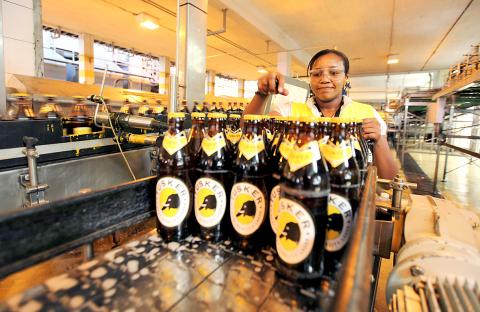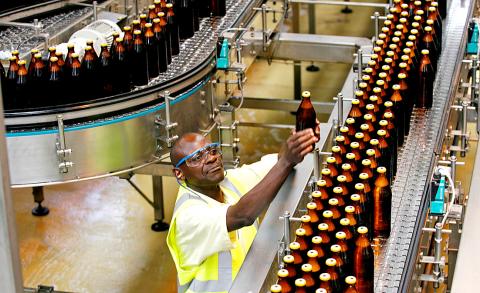International brewers in Africa are expanding their production of beers based on local ingredients, snapping up craft brewers and introducing more brands as low-cost beers gain popularity on the fast-growing but still poor continent.
Diageo acquired a South African rival specializing in local beer last year, while SABMiller is opening new production lines in markets such as Zimbabwe where cheap competitors and illicit brews often out-sell more globally recognized competitors.
Diageo unit Uganda Breweries Limited (UBL) has pinned hopes on Ngule, or “Crown” in the Luganda language, that started production this year based on cassava, a tuber that is a staple food in the nation at the heart of Africa’s Great Lakes region.

Photo: Reuters
Ngule has captured 7 percent of the formal beer market in just five months after launch, UBL says, winning customers in dusty drinking holes in poor districts of Kampala like Hope Naturinda’s bar, where it sells for US$0.65 per 500ml, less than half the price of Diageo’s renowned Guinness brand.
“More than half of my customers take Ngule now,” said Naturinda. “It’s affordable and very strong.”
It also highlights a challenge multinationals have faced across Africa. While the continent still boasts some of the world’s fastest growing economies, even with a commodities price slide, global consumer brands are still waiting for a new middle class to emerge wanting to pay for their best-known products.

Photo: Reuters
Some have responded by scaling back plans for the continent, with foods giant Nestle saying last year it was cutting 15 percent of its workforce in Africa because it had overestimated the rise of the middle class.
But in the beer business, brewers from Nigeria to Kenya and Uganda to Mozambique are turning instead to maltose extract from cassava or malted sorghum grain to replace pricier barley, helping reduce input costs and creating new popular products.
LOCAL TASTES
“Traditional African beers present a significant opportunity within these markets,” said SABMiller spokesman George Hudson.
“To play seriously within the affordable segment in Africa, which is one of the largest in the world, it is important to produce beverages that are attuned to local tastes, at prices that are fair and reasonable,” he said.
Global brands often find their offerings competing with far cheaper, unlicensed alcoholic drinks, including some lethal distilled concoctions.
“A substantial amount of alcohol consumed in most of these markets is informal and untaxed because mainstream alcohol is relatively unaffordable,” said SABMiller’s Hudson.
Consequently SABMiller is fighting back with drinks tailored to specific markets. In Zimbabwe it is commissioning a new production line for its sorghum-based Chibuku beer, the third expansion in three years, and in Mozambique its cassava-based Impala brew is winning clients in the capital and beyond.
“I drink Impala because it’s the cheapest beer around here,” said Clemente Macie, a plumber, sipping from a bottle at Pequeno Brasil (Little Brazil) bar, in Khongolote near Maputo.
Local sorghum has been a barley substitute for Nigerian Breweries, a unit of Heineken, since the 1980s. Since last year, it has worked with a local firm and US-based non-profit organization International Fertilizer Development Centre to improve cassava production.
“The brands that contain maltose extract from cassava in their recipe are presently the fastest selling beer brands in Nigeria,” said Heineken spokesman Jesper Kleingeld.
That is good news for consumers like Gilbert Amoko, a 35-year old driver in Kampala, who says he can now afford to drink regularly.
“I used to drink occasionally because I could not afford it. With Ngule I can afford to drink at least three times a week,” he said.

Aug. 25 to Aug. 31 Although Mr. Lin (林) had been married to his Japanese wife for a decade, their union was never legally recognized — and even their daughter was officially deemed illegitimate. During the first half of Japanese rule in Taiwan, only marriages between Japanese men and Taiwanese women were valid, unless the Taiwanese husband formally joined a Japanese household. In 1920, Lin took his frustrations directly to the Ministry of Home Affairs: “Since Japan took possession of Taiwan, we have obeyed the government’s directives and committed ourselves to breaking old Qing-era customs. Yet ... our marriages remain unrecognized,

During the Metal Ages, prior to the arrival of the Dutch and Chinese, a great shift took place in indigenous material culture. Glass and agate beads, introduced after 400BC, completely replaced Taiwanese nephrite (jade) as the ornamental materials of choice, anthropologist Liu Jiun-Yu (劉俊昱) of the University of Washington wrote in a 2023 article. He added of the island’s modern indigenous peoples: “They are the descendants of prehistoric Formosans but have no nephrite-using cultures.” Moderns squint at that dynamic era of trade and cultural change through the mutually supporting lenses of later settler-colonialism and imperial power, which treated the indigenous as

An attempt to promote friendship between Japan and countries in Africa has transformed into a xenophobic row about migration after inaccurate media reports suggested the scheme would lead to a “flood of immigrants.” The controversy erupted after the Japan International Cooperation Agency, or JICA, said this month it had designated four Japanese cities as “Africa hometowns” for partner countries in Africa: Mozambique, Nigeria, Ghana and Tanzania. The program, announced at the end of an international conference on African development in Yokohama, will involve personnel exchanges and events to foster closer ties between the four regional Japanese cities — Imabari, Kisarazu, Sanjo and

By 1971, heroin and opium use among US troops fighting in Vietnam had reached epidemic proportions, with 42 percent of American servicemen saying they’d tried opioids at least once and around 20 percent claiming some level of addiction, according to the US Department of Defense. Though heroin use by US troops has been little discussed in the context of Taiwan, these and other drugs — produced in part by rogue Chinese Nationalist Party (KMT) armies then in Thailand and Myanmar — also spread to US military bases on the island, where soldiers were often stoned or high. American military policeman